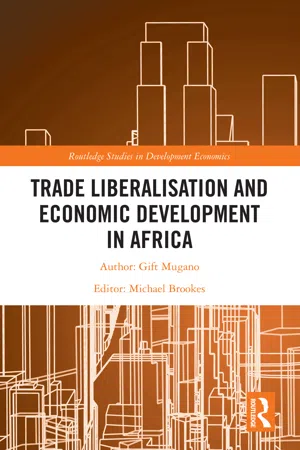
Trade Liberalisation and Economic Development in Africa
Gift Mugano, Michael Brookes, Michael Brookes
- 238 pages
- English
- ePUB (mobile friendly)
- Available on iOS & Android
Trade Liberalisation and Economic Development in Africa
Gift Mugano, Michael Brookes, Michael Brookes
About This Book
This book provides a thorough and rigorous discussion on the impact of trade liberalisation on economic development with a special focus on the African continent. The author presents the rationale for trade liberalisation, trade liberalisation frameworks, the trade liberalisation economic development nexus, impediments to trade, and contemporary issues of international trade.
In this book, notwithstanding the benefits from trade liberalisation, the author shows that African trade as a share of global trade has remained flat at 3% as in 1975, while the continent's exports have remained raw materials and its intra-regional trade at less than 15% of total trade, which is the lowest in the world (UNCTAD, 2020). With respect to key economic development indicators such as economic growth, poverty levels, and employment levels, this book shows that, ironically and in direct contrast with the conventional views that trade liberalisation alleviates poverty, trade liberalisation in Africa has resulted in high levels of unemployment and low economic growth which ultimately lead to increased poverty. In addition, this book provides a detailed analysis of why trade liberalisation has failed to yield meaningful benefits to Africa. The binding constraints and blockages which prevent positive spin-offs on trade liberalisation in Africa are discussed in detail in this book.
In the same vein, the author provides practical strategies which must be adopted by African countries in order to gain from trade liberalisation, making this work a must-read for African governments, academia, trade experts, regional trading blocs, the World Trade Organization, and development partners. In view of this, and as part of the disruptive and structural transformation policies, the author discusses case studies and international experience contextualised to Africa as well as strategies for addressing the trade-related infrastructure gap, production capacities, export promotion, and aid for trade.